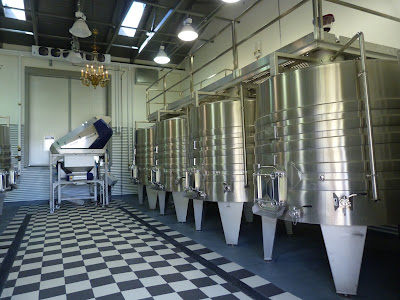Photo: Culmina winery's elegant cellar
The spring
release wines from Culmina Family Estate Winery include a rosé and two white
varietals.
I have notes
on all of them but I want to give special attention to the winery’s Grüner
Veltliner, the renowned Austrian white. Culmina called its wine Unicus since
the release of the first vintage in 2013 because it was the Okanagan’s first
Grüner Veltliner.
There still
is not a lot of Grüner Veltliner – GV for short - being grown in British
Columbia; only two other producers (De Vine Vineyards and BC Wine Studio) come
to mind. I believe one or two other growers have planted the variety recently.
The only
reason that the variety was not planted sooner is that, until recently, the
growers had no source for virus-free vines; or no source that the Canadian
government would recognize. It is a variety that should flourish, especially in
the Okanagan.
In her book,
Wine Grapes, Jancis Robinson [with
colleagues Julia Harding and José Vouillamoz] describes GV as an
“internationally fashionable variety” that is on a bit of a roll, having broken
out of its home base of Austria, the Czech Republic and neighbouring countries.
“When yields
are high (up to … 5.7 tonnes/acre …) the wines are crisp, fresh and inoffensive,
as in large swathes of the Weinviertel [in Austria],” they write. “But in the
hands of the best growers and on the best sites … they can be stunningly concentrated
and ageworthy: typically dry and full-bodied with a peppery perfume and firm,
minerally citrus and sometimes spicy flavours … Wines produced on the plain are
often more peachy and fruit dominated.”
The GV at
Culmina, where it is well grown, shows some characters comparable with a
well-made Austrian GV.
Culmina also
grows Riesling in the same vineyard as GV, a mountainside property called
Margaret’s Bench. The winery has released five vintages of Riesling but just
three vintages of the more recentky-planted GV. Both are fine wines. I
preferred the GV as the more demonstrative of the two in the glass. Riesling is
a variety that flowers with a few years of age, at which time it should have no
difficulty matching the appeal of GV.
The three
wines reviewed here are available at the winery and to members of the Culmina
wine club (there is not enough volume to list them in the BC liquor stores). I
would encourage purchasers to pick up a few extra bottles of the two white
wines to see how they develop with age. The winery says one to three years for
the GV and three to five years for the Riesling.
Here are my
notes.
Culmina Unicus 2015 ($27). This is 100% GV; some 24% was
fermented in a concrete amphora, 33% in a concrete egg and 43% in stainless
steel. This makes for a complex, richly textured wine. It begins with tropical
aromas of citrus with that classic hint of white pepper. On the palate there
are flavours of lychee and grapefruit. The acidity is fresh and the finish just
goes on and on. 92.
Culmina Decora 2015 ($21). This is 100% Riesling. This
was fermented entirely in stainless steel. The wine’s racy acidity gives this
wine a brightness in its youth and great ability to age. It begins with aromas
of lemon and lime zest. These are echoed on the palate, along with a backbone
of chalky minerals. At this stage in its life, the wine is tightly wound, with
a laser-like focus. 89-91.
Culmina Saignée 2015 ($22). The varietal blend is 42%
Merlot, 28% Cabernet Sauvignon, 21% Cabernet Franc and 9% Malbec. This wine
presents with a hue of orange-tinted rose petals. Muscular and fleshy, the wine
has aromas of cherry and strawberry with flavours cherry, ripe apple and rose
hip. The robust character and alcohol (14%) reflects the hot vintage. 89.




No comments:
Post a Comment